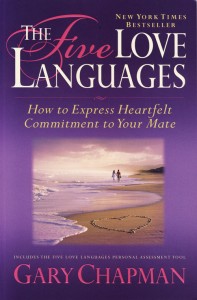How Might Your Spouse’s Love Language Affect Your Finances?
 I’m sure that many of you are familiar with Gary Chapman’s theory of the Five Love Languages (affiliate link – thanks for using!). But have you ever considered how your love language and your spouse’s love language might affect your spending habits and career?
I’m sure that many of you are familiar with Gary Chapman’s theory of the Five Love Languages (affiliate link – thanks for using!). But have you ever considered how your love language and your spouse’s love language might affect your spending habits and career?
For those of you who haven’t read any material by Chapman, I’ll briefly summarize the idea: Every person has an emotional “love tank” that can be filled or emptied by their relationships (we’ll focus on the marital relationship). Happy marriages are created by spouses regularly filling each other’s love tanks, and marital dissolution many times occurs after the tanks have been empty for quite some time. The most effective way to fill your spouse’s tank is by speaking his primary “love language.” Chapman has identified the five love languages that people identify with: words of affirmation, quality time, receiving gifts, acts of service, and physical touch.
Words of Affirmation
If your spouse’s love language is words of affirmation, you fill her love tank by speaking or writing kind, complimentary, encouraging words to her. That’s it! I don’t see any financial ramifications to fulfilling this need as “talk is cheap” (but not to someone who has that love language!).
Quality Time
The need for quality time spent together could manifest itself as having focused conversations or doing activities together. Conversations likely won’t require spending, but activities together (especially vacations!) definitely could. Of course, a spending-conscious couple could easily find ways to have quality time together without spending money. One major effect might be on career choices. If your spouse values quality time, you would probably damage or dampen the relationship by taking a job with long hours or frequent travel. There may be ways around this – for instance, if your spouse loves quality conversations over activities, he may by satisfied with a nightly phone or Skype call – but anyone in this type of relationship should carefully consider whether and how being away from your partner for long periods would drain his love tank before choosing that job.
Receiving Gifts
This love language plainly has a financial implication – most gifts cost money! Compared with a couple that doesn’t value gifts, one that does may spend a decent amount of money fulfilling this need. If you are on a tight budget, probe whether or not “it’s the thought that counts” for your spouse and find ways to fill his tank with your time an effort instead of money. Chapman assures his readers that “the cost of the gifts will matter little, unless it is greatly out of line with what you can afford” (The Five Love Languages, p. 84).
Chapman addresses the spender/saver divide by encouraging a saver to think of gifts as an investment. “If you are a spender, you will have little difficulty purchasing gifts for your spouse; but if you are a saver, you will experience emotional resistance to the idea of spending money as an expression of love… If you discover that your spouse’s primary love language is receiving gifts, then perhaps you will understand that purchasing fits for him or her is the best investment you can make. You are investing in your relationship and filling your spouses’ emotional love tank, and with a full love tank, he or she will likely reciprocate emotional love to you in a language you will understand.” (The Five Love Languages, p. 85-86.)
Acts of Service
Generally, this love language means receiving acts of service, but like any other love language we tend to speak what we want to hear. I think that a spouse having this love language might be able to save the couple some money (if not time). If a similar couple without an acts of service love language might be inclined to outsource certain household tasks, one with this love language would value the other spouse performing acts to show how much she loves her spouse. These actions could include cleaning or picking up the house, maintaining the car, caring for children, preparing food, giving a massage, and much more.
Physical Touch
The emotional need for physical touch is in addition to the physical desire for sexual intercourse (just to get that out of the way). Someone with this love language would greatly value small touches like hugging, hand-holding, hair-stroking, etc. Like words of affirmation, the touching itself shouldn’t have a financial impact, in my mind. But similar to quality time, a spouse with this love language would have a very difficult time if she or her spouse had to travel frequently for work or their hours together each day were limited. So there may be some career limitation here as well.
My love language is quality time with a close second of physical touch, so while I find the prospect of management consulting work (for instance) attractive, I don’t think I could stand being away from Kyle several days per week and working such long hours. Aside from that limitation, I find that those love languages pair well with our frugal ways. (Kyle refuses to tell me what his love language is. I try to sort of do them all, except gifts. One of these days I’m going to sneakily administer the quiz to him.)
Have you identified your and your partner’s love languages (take the quiz)? How has your or your partner’s love language affected your finances?
Filed under: books, marriage, psychology · Tags: 5 love languages, Gary Chapman, gifts

 All I Want for Christmas Is a Giving Revolution
All I Want for Christmas Is a Giving Revolution Don’t Use Gifts to Avoid Joint Finances
Don’t Use Gifts to Avoid Joint Finances Why I Love Joint Finances
Why I Love Joint Finances How Sharing a Car Has Helped Our Joint Finances
How Sharing a Car Has Helped Our Joint Finances


Hmm.. this is interesting. Mine is probably acts of service with a small amount of physical touch mixed in. I think it probably saves money – I mean, I would rather my boyfriend change my oil for me, or whatever.
Daisy recently posted..What I Spend To Look Good: Skin Care Edition
I’m glad my guess about acts of service is true for your relationship! We definitely pay someone else to maintain our cars. 🙂
As an avowed introvert, what I find myself needing much of the time is space: physical and mental space to decompress and not need to worry about the needs or demands of anyone else.
The rest of the time, I’d say quality time. I’d say that my wife is a combination of acts of service (75%) and physical touch (25%)
Edward Antrobus recently posted..3 Ways You Can Watch Hulu on Your TV without Paying for It
Actually my husband said something similar to what you did: “Can my love language be you leaving me alone to play video games?” (This did not come off in a mean way!) Probably with your needs for being alone and quality time as well the time you spend with your wife is truly meaningful and valuable, instead of just spending lots of not-so-quality time together as might be my inclination.
I’m acts of service (in terms of giving and receiving).
T is all about physical touch.
Both cheap, I guess.
Like Edward, I’m a diehard introvert (ISFJ) so I need a lot of alone time. T is terrible at spending time by himself, but he tends to socialise a lot more than I do so it works out well; he can hang out iwth friends while I chill at home.
eemusings recently posted..Does morality matter when it comes to making a living?
It’s interesting that you guys have pointed out how introversion and extroversion can interact with these love languages – I hadn’t thought of that before.
Can I have mine be all of them!? 😉
Well Heeled Blog recently posted..Blog Sale, Blog Sale
It’s probably not best… You and your fiance should take the quiz – wedding gifts to each other.
When we were engaged, J and I both scored evenly across the board. [Except, even then, “gift giving” was low for both…and “touch” was slightly higher for him, which is typical for guys.] The book says that two types of people have difficulty identifying their language: 1) those who tanks are overflowing already and 2) those who haven’t been loved for so that they don’t remember what makes them feel good. Anyway, it doesn’t surprise me that in the height of the “in love” phase, someone might have difficulty identifying their language.
When I just took the quiz, “Quality Time” came out on top. This is probably a result of having to operate long-distance for the last couple of weeks…
haha – please don’t grade me on my grammar… 😉
I took the quiz and got Words of Affirmation and Physical Touch. Which makes me look kind of insecure? But that also makes me a cheap date. :p
femmefrugality recently posted..A Moment of Silence
I don’t think it makes you insecure at all! I think my mom’s LL is words of affirmation because she used to speak it to me.
Once again – an interesting, creative post Emily! I don’t know how you made the connection between Love Languages and PF… fantastic. I love this book. It even illuminated to me how I can relate to my mother better!
We both score lowest on gift giving, making valentine’s day and anniversaries (well, “month”-iversaries in our case…) very cheap for us!! I’ve been thankful for that when I see other couples go out for expensive dinners and buy roses and stuffed animals and the like…
Same for us… well, me, and I’m assuming Kyle. We’d rather pay for experiences together to be our “gifts” – which I guess is quality time!
The book helped me understand my parents better, too!
We don’t buy birthday gifts for each other – ever. Sometimes we plan for a vacation to coincide with a birthday, but otherwise it’s a nice dinner out (and by nice dinner I mean a sit-down restaurant meal – as opposed to take-out)
I think our “tanks” are still full… despite the lack of gifts.
Julie @ Freedom 48 recently posted..Canada’s Duty Free Limits Increase!
We haven’t done gifts since we got married, either. I am like a 0 on gifts!
[…] @ Evolving Personal Finance writes How Might Your Spouse’s Love Language Affect Your Finances? – The most effective way to fill your spouse’s emotional love tank is to speak his […]
[…] I always like when people attempt to get others to read more.Evolving Personal Finance talked about love languages and how they can affect a couple’s finances.Make Money, Make Cents pointed out that the […]
[…] […]
[…] from Work Save Live included How Might Your Spouse’s Love Language Affect Your Finances? in his weekend […]
[…] 2) How Might Your Spouse’s Love Language Affect Your Finances? […]
[…] How Might Your Spouse’s Love Language Affect Your Finances? […]
[…] 2) How Might Your Spouse’s Love Language Affect Your Finances? […]
[…] The first is pretty dear to my heart because it’s a book that I’ve read and definitely impacted my thinking. Emily over at Evolving PF talked about How Might Your Spouse’s Love Language Affect Your Finances? […]
[…] bought a present for Kyle for $21.48. I NEVER do this (my love language is 0% gifts). Also he apparently doesn’t look at our Mint account closely enough to question a $20 […]